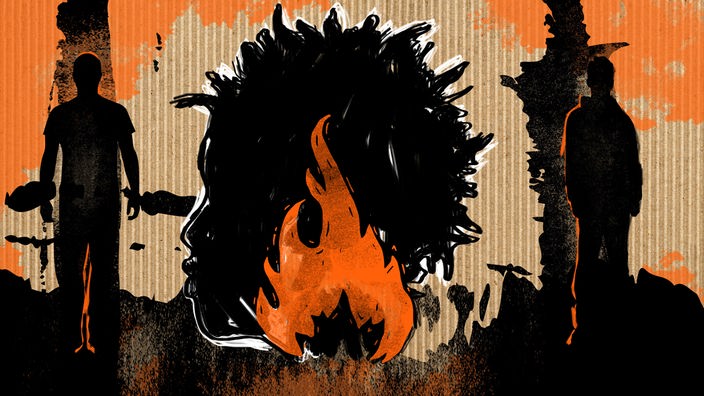
Oury Jalloh and the Dead Men at Dessau Police Station
An African asylum seeker burns to death whilst in police custody in 2005. Officials claim that the man. whose feet and hands had been tied, had set fire to himself. Despite repeated attempts over 15 years, the judicial system has failed to solve the case and turned it into a political issue.
Von Margot Overath
For over a decade, the author has been following this case, studying the files, speaking to witnesses, police officers, prosecutors, fire experts, forensic doctors and criminologists, to gain a very disturbing picture. The research has revealed a mix of factors which at the time of the crime were not just exclusive to Saxony-Anhalt. This followed a brutal tradition of the GDR police force, paired with openly everyday racism and violent right-wing radicalism. All this has been played down by top people in administration and politics - with some of it now becoming a nationwide problem.
This five-part feature series documents the arduous search for the truth regarding the death of Oury Jalloh and two other citizens of Dessau. It also reveals why victims of police violence often have very little chance, and how the spirit of comradeship and misunterstood loyalties in law enforcement can pose a threat to the rule of law. The author tells how a police scandal turned into a legal scandal which has in the meantime reached a political level. There is still hope of a late clarification of this here. If not, the European Court of Human Rights could soon be dealing with the question of whether there is a civil gap in Germany with regard to "victims of minor importance".
Part 1: The Body is to Blame
Barely an hour after the discovery of the charred body, the persons responsible at Dessau police force have made up their minds: The man in the cell is said to have set himself on fire. They will stick firmly to this version; over many years and court cases, against all logic and against ever new evidence. It cannot be what must not be. Correspondingly, the investigations will be conducted from the first moment on.
Part 2: Laid on the Stomach
Under public pressure, the criminal prosecution authorities have the fire reconstructed - it cannot be explained without an accelerant. A senior public prosecutor wants to investigate on suspicion of murder - and is thwarted by his superior. New findings come to light - Oury Jalloh must have been severely maltreated before his death. Officials report anonymously how authoritarian structures and brutal police traditions live on.
Part 3: The Citizen Slept Soundly
The asylum-seeker Oury Jalloh was not the first dead person in and around Dessau police station. The author unfolds files that have been closed for a long time and sets off on a search for clues together with criminologists and forensic experts - in the process she discovers frightening parallels to the current case.
Part 4: Victims of Lesser Importance
Right-wing radicalism and racism are not special features of Dessau. But hints of such tendencies - even within the police force - were not welcome here. The author asks which structures encourage corps spirit and the covering up of violence - and which again and again lead to victims elsewhere.
Part 5: The Higher Worth
Elaborate investigations against a state apparatus or discontinuation of the proceedings? Faced with this alternative, the State Attorney General of Saxony-Anhalt opts for the latter. And the highest court follows suit. The suicide thesis is revived - and the clock is turned back 15 years. In the state parliament the question is raised what is worse for the constitutional state - that police officers burn a person or that it will come to light ?
Broadcasted 17. May to 14. June 2020
Author: Margot Overath
Commissioning Editor: Thomas Nachtigall
Production: WDR 2020




![Symbolbild WDR Feature-Depot: Eine Giraffe trägt einen Kopfhörer | Bildquelle: WDR/Joe Castro/AAP/dpa [m] n.urru Symbolbild WDR Feature-Depot: Eine Giraffe trägt einen Kopfhörer](/mediathek/audio/sendereihen-bilder/giraffe-kopfhoerer-feature-depot-100~_v-ARDKleinerTeaser.jpg)







